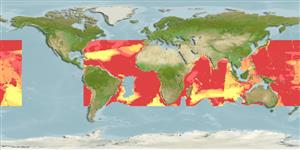Common names from other countries
>
Zeiformes (Dories) >
Grammicolepididae (Grammicolepidids) > Grammicolepidinae
Etymology: Grammicolepis: Greek, grammikos = geometrically + Greek, lepis = scale (Ref. 45335).
More on author: Poey.
Environment: milieu / climate zone / depth range / distribution range
Ecología
marino batipelágico; rango de profundidad 300 - 1026 m (Ref. 4517), usually 500 - 700 m (Ref. 52595). Deep-water; 42°N - 37°S, 80°W - 154°W
Eastern Atlantic: Spain to the Gulf of Guinea and southward to Durban, South Africa. Western Atlantic: Georges Bank to off Suriname. North Pacific: Japan and Hawaii.
Tamaño / Peso / Age
Maturity: Lm ? range ? - ? cm
Max length : 64.0 cm TL macho / no sexado; (Ref. 4255)
Espinas dorsales (total) : 6 - 7; Radios blandos dorsales (total) : 32 - 34; Espinas anales: 2; Radios blandos anales: 33 - 35. Body silvery in color; young with irregular black blotches on body, black spots on caudal fin, and 5 black bars on anal fin (Ref. 4255). Gill rakers rudimentary.
Found in deep midwater or near bottom (Ref. 6749); benthopelagic (Ref. 52595). Caught by bottom trawl, bottom lines and drift gill net (Ref. 87951).
Life cycle and mating behavior
Maturities | Reproducción | Spawnings | Egg(s) | Fecundities | Larva
Karrer, C., 1990. Grammicolepididae. p. 634-636. In J.C. Quero, J.C. Hureau, C. Karrer, A. Post and L. Saldanha (eds.) Check-list of the fishes of the eastern tropical Atlantic (CLOFETA). JNICT, Lisbon; SEI, Paris; and UNESCO, Paris. Vol. 2. (Ref. 4503)
IUCN Red List Status (Ref. 130435)
CITES (Ref. 128078)
Not Evaluated
Threat to humans
Harmless
Human uses
Pesquerías: sin interés
Herramientas
Special reports
Download XML
Fuentes de Internet
Estimates based on models
Preferred temperature (Ref.
115969): 6 - 12.3, mean 8.2 (based on 417 cells).
Phylogenetic diversity index (Ref.
82804): PD
50 = 1.1250 [Uniqueness, from 0.5 = low to 2.0 = high].
Bayesian length-weight: a=0.01995 (0.00935 - 0.04259), b=2.91 (2.72 - 3.10), in cm Total Length, based on LWR estimates for this species & (Sub)family-body (Ref.
93245).
Nivel trófico (Ref.
69278): 3.9 ±0.9 se; based on size and trophs of closest relatives
Resiliencia (Ref.
120179): Bajo, población duplicada en un tiempo mínimo de 4.5-14 años (Assuming tmax > 10).
Fishing Vulnerability (Ref.
59153): Moderate to high vulnerability (46 of 100).
